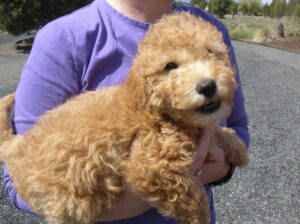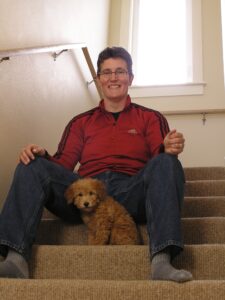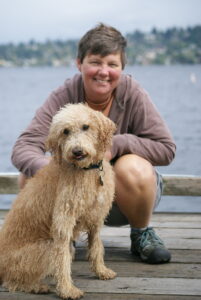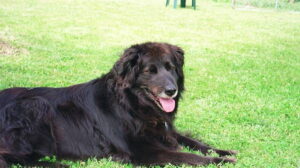January 16, 2022
Day Fourteen of Remembering
To Love What Death Has Touched
‘Tis a fearful thing
to love what death can touch.
A fearful thing
to love, to hope, to dream, to be –
to be.
And oh, to lose.
A thing for fools, this,
And a holy thing,
a holy thing
to love.
For your life has lived in me,
your laugh once lifted me,
your word was gift to me.
To remember this brings painful joy.
‘Tis a human thing, love,
a holy thing, to love
what death has touched.
– Yehuda HaLevi
I have carried this poem with me since my mother suffered her stroke. I read it several times a day while sitting with her in the nursing home and all through her hospice and again and again  after her death. The night before we said goodbye to Rubin, I read it again though by this time it was mostly memorized. Yet, every time I read it, every time I say the words out loud, I catch my breath – a small gasp of pain and anguish — realizing once more that all love, at some undeclared point, ends.
after her death. The night before we said goodbye to Rubin, I read it again though by this time it was mostly memorized. Yet, every time I read it, every time I say the words out loud, I catch my breath – a small gasp of pain and anguish — realizing once more that all love, at some undeclared point, ends.
My father, after living with Parkinson’s for so long, chose his death in the end. He fell ill with an intestinal infection and at the hospital emergency room, was given numerous tests. The test he failed most profoundly was the “swallow test” as the Parkinson’s combined with the infection had taken his ability to swallow. A feeding tube was the only answer and yet when asked, he refused it and subsequently refused any and all “extraordinary measures” that might sustain his life. He entered hospice and within a week, passed.
On the other hand, my mother did not choose death until the last few days. Her stroke paralyzed

the left side of her body and though she could use words to speak, as the days and weeks progressed, the words and communication faltered becoming, as the hospice nurse described it, a “word salad.” Yet, mom was determined, at first, to overcome her condition. You could see it in the way she set her jaw, the steely blue look in her eyes — how she tapped into the well of will power and fortitude she had relied on her entire life. But soon, even that faded and the words became fewer, her eyes lost their conviction and stared, unfocused to some point beyond us.
I still question whether Rubin was truly aware of the decision that had been made and while I’ve always been an advocate of death with dignity, the waters are much murkier when it comes to our pets. Recently, friends had used many of the same words and phrases I used when their dog was close to the end of this journey. “Will they get better? What’s the quality of their lives?Isn’t one day early better than a day late? Is keeping them alive to decline even further really what you want?” They are important questions, they are important thoughts to keep in mind, but still, there is this wavering blurry line

of knowing when it’s time and not knowing when it’s time. There is no correct answer. There never will be. Instead, you must guess with your heart as full of love as it is of sorrow.
I have always told my clients who have dealt with this same decision that letting our furry loved ones go is a gift. These past few weeks I have struggled to find the gift. Rubin leaves a gaping hole in our lives. He filled every moment of our existence from the day he entered the house. Yes, we did things without him, but he was there in the background as we checked in with pet sitters from our vacation in Mexico or left a dinner with friends earlier than we would have if he weren’t waiting for us at home. We took him everywhere when we could. He loved riding in the car. His second house, we called it, as he took over the back seat of every vehicle we ever owned. And he equally loved arriving at new places as he did at familiar places — my brother’s acreage, my parents’ house, the houses of friends or at a meet up location at the head of a trail or the entrance to a park.
Now those daily routines and surprise journeys feel hollow. Yes, we have Oscar, but even he is struggling with the changes. Though Oscar was the tough guy of the pack, he was also  remarkably sensitive, always checking in to see what his brothers were doing and alerting them to any perceived danger. He has seen two of his elders pass; there is no gift in watching his pack shrink. Now he must carry the mantle of leadership and for the first time since we have known him, he is uncertain.
remarkably sensitive, always checking in to see what his brothers were doing and alerting them to any perceived danger. He has seen two of his elders pass; there is no gift in watching his pack shrink. Now he must carry the mantle of leadership and for the first time since we have known him, he is uncertain.
I am uncertain as well. My leadership role in my immediate pack has shifted too. Compared to Rubin, Oscar is an easy dog. He is not high strung or anxious, doesn’t need to follow me wherever I go, and never insists on my focused attention. Yet, this past week, when I was hobbled with a back injury and unable to take him for walks, he has stayed by my side, worried about leaving me for too long. His sensitivity to the emotions of the house have been the most accurate compass. His attentiveness requires that I look closely at my own grief, comb through the rubble of my memories and sadness to find threads of solace and comfort.
There is a shift within my human family as well. Our mother was the center of the wheel. She held my brother, sister, and me together and even when my father was alive, she was the axle of our family wheel. With her gone, things feel flung about, without the gravity of purpose. We try – the three of us – to hold onto the feeling she brought to our family, but her quiet and insistent  leadership feels, in many ways, irreplaceable.
leadership feels, in many ways, irreplaceable.
And I am floundering. It makes sense that my back would give out on me. It happened like this once before when I had to say goodbye to my first dog, Abbie. A month after I let her go, I ruptured a disc in my back and had to have surgery after four months of crippling pain. This time it is my sacroiliac (SI) joint, the joint that links your pelvis to the lowest part of the spine. Its job is to transfer weight and forces between the upper body and the legs, to essentially transfer energy. With my SI joint out, walking is difficult. Therefore, I am forced to rest and in resting, I cannot distract myself with doing. I must literally sit and just be, just heal.
Perhaps this is the gift my losses have offered me. I cannot transfer my energy. Instead I just pay attention to the inertness of my body, of my grief. The days feel long and the nights arrive too soon. Perhaps this is what is holy – the ability to observe, to feel, to remember that which death has touched. The painful joy. And perhaps love doesn’t end; it just carries on with all who are left in the wake of the holy remembering.